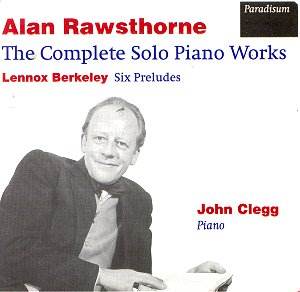ALAN RAWSTHORNE (1905-1971)
The Piano Music
Four Bagatelles (1938)
Sonatina (1949)
Four Romantic Pieces (1953)
Ballade (1967)
Theme and Four Studies (1971)
LENNOX BERKELEY (1903-1989)
Six Preludes (1945)
 John Clegg (piano)
John Clegg (piano)
 rec All Saints, Petersham,
21-22 Feb 1996 PARADISUM PDS-CD2 63.15
rec All Saints, Petersham,
21-22 Feb 1996 PARADISUM PDS-CD2 63.15
Details of this CD and credit/debit card sales from
PARADISUM RECORDS LTD
19 Grove Hill, South Woodford,
London E18 2JB, United Kingdom
Phone:+44 (0) 20 8530 5454
Online Catalogue: www.paradisum.com (secure credit/debit card purchasing)

This Lancashire born composer does not fit into the classic pastoral stream
of British romanticism. He is a romantic but his very personal mode of expression
accommodates severity and discord alongside a deeply rooted sense of reflection.
Works like the First Symphony (available on Lyrita coupled with the other
two symphonies.) and Symphonic Studies are more approachable as is
the First Violin Concerto and the film music (a collection of which is due
soon from Chandos to join their anthologies of Arnold, Alwyn and Auric).
His works are, through the admirable industry of the Rawsthorne Trust, being
recorded complete on a variety of labels: mainly Naxos and ASV. Paradisum
contribute the piano music on this disc of recordings made as long ago as
1996.
The Four Bagatelles (1938, and dedicated to Gordon Green) are
elusive, beguiling and epigrammatic to the point of being Haikai. The
Sonatina (in four movements running short of 12 minutes) spins
and flies in the first movement), reflects amid eddies and swirls in the
lento, peals in gentle Brahmsian rivulets in the Allegretto and floods in
a revolutionary ice-cold douche in the Shostakovichian accents of the Allegro
con brio. That douche and flood carry over into the first and third of the
Four Romantic Pieces. The set is dedicated to that British
arch-romantic pianist Frank Merrick (who, if I recall correctly, recorded
them). The second is almost Medtnerian - in the set of its jaw if not in
its tonality. Certainly it qualifies as highly romantic while the rocky landscape
of the Adagio maestoso hints at Dies Irae. John Ogdon (a troubled
genius of a pianist if ever there was one) recorded the Ballade
for EMI. It is the single largest (12.49) continuous span of piano music
written by Rawsthorne. It is a tough work of awkward virtuosity: angular
and brusquely percussive (look at its date of composition) at times with
reminiscences of Dies Irae. The Theme and Four Studies
are not as imposing as the Ballade and seem to look back to the
Romantic Pieces.
If you like this music then don't miss ClassicO's 15CD set of the piano music
(well some of it!) of Dane, Niels-Viggo Bentzon (reviewed elsewhere on this
site).
Lennox Berkeley's Six Preludes are also well under John Clegg's fingers.
He has broadcast them several times on BBC Radio 3. In some ways they are
similar to the Rawsthorne Bagatelles but without the dissonant overlay. They
are playful, Poulencian - certainly Gallic in their insouciant wing-beat
- a sort of staid Gershwin. These works are extremely attractive (sample
the two andantes - tracks 20 and 24) and there is no work to be done
in enjoying them!
The insert notes are by Roy Scott and are a bit too technical for my liking
or (more truthfully) knowledge. Much of their content will not support the
interested general listener. As far as the music is concerned this is a very
strong collection indeed. One would expect as much from John Clegg who has
been associated with this music since the 1950s.
Reviewer
Rob Barnett


![]()